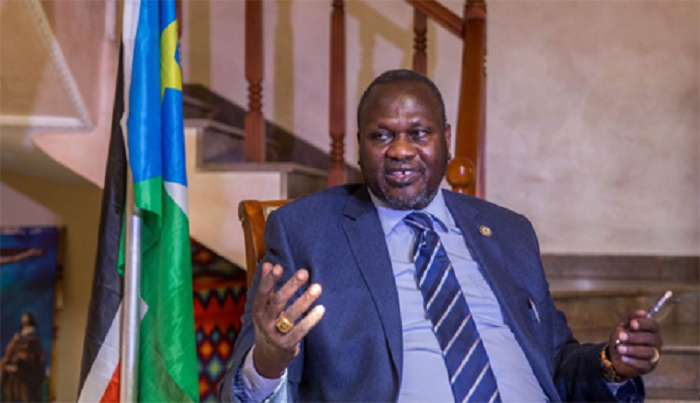Johannesburg, October 23, 2016 (GSN) - South Sudan’s ousted Vice President Riek Machar outlined his plan to return from exile and revive a shattered peace plan, warning that failure to include him in the country’s political setup risks an outbreak of genocide.
Mr. Machar, a rebel leader, said he plans to meet with the leaders of countries neighboring South Sudan to discuss how to resuscitate the peace accord he reached with his rival President Salva Kiir last year.
He said he also expects to return to South Sudan before the end of the year.
Without immediate steps to restore peace to South Sudan, Mr. Machar warned, Mr. Kiir’s government could carry out genocide against his Nuer tribe, as well as other South Sudanese tribes such as the Equatorians.
The government has targeted civilians by tribe since 2013, with attacks on the Nuer community, Mr. Machar said. “This time the people in Equatoria are bearing the brunt. I wouldn’t rule it [genocide] out,” he told The Wall Street Journal in an interview in Pretoria.
A spokesman for the government of South Sudan said Mr. Machar can only return to the country as a normal civilian but will have no part to play in politics.
“He doesn’t have any space politically as he has become synonymous with wars,” Ateny Wek Ateny said on Wednesday.
The government had repeatedly denied it is targeting civilians because of their tribe and says its forces are fighting against rebels.
In the interview, Mr. Machar, 63 years old, described his flight on foot to the Democratic Republic of Congo in August, after the peace accord he signed with Mr. Kiir a year earlier collapsed and fighting broke out.
Mr. Machar, who received a doctorate in philosophy in the U.K., said he was injured during his escape, during which he was accompanied by his wife, politician Angelina Teny, and dozens of loyalist rebels. He received medical treatment in Sudan.
South Sudan gained independence from Sudan in 2011 after fighting a decadeslong war. The country’s struggle was supported by the international community and the U.S., as well as by a group of nongovernmental organizations and Hollywood stars, including George Clooney.
But in December 2013 war broke out, amid a power struggle between Messrs. Kiir and Machar, in which the president accused his former deputy of attempting a coup. In the fighting, which broke down broadly but not exclusively along tribal lines, Dinka government forces loyal to Mr. Kiir targeted Nuers.
Following last year’s peace agreement, Mr. Machar returned to the capital Juba to join a transitional government under Mr. Kiir.
By July, that agreement was shattered by violence, which was marked by mass rapes of local women and Western aid workers by government troops, according to eyewitnesses and victims as well as the United Nations and independent observers. The government has said it is investigating the claims.
Since Mr. Machar’s departure from South Sudan, Taban Deng Gai, also a Nuer, has succeeded him as vice president. Mr. Machar said Mr. Deng has neither command of the rebel troops nor authorization to represent Nuers in government.
“He has no support from anyone,” said Mr. Machar, describing why he is indispensable for any lasting peace in South Sudan.
Mr. Ateny, the government spokesman, said Mr. Machar’s claim was “exceedingly ridiculous,” and that Mr. Deng is the indisputable leader of the opposition forces.
But Mr. Deng isn’t seen by independent experts as commanding sufficient support among troops or Nuers.
“I don’t think Taban Deng commands the commanders on the ground. From that point of view Riek Machar is very much an important part of the picture—his determination to return means that he will continue to command an important constituency,” said Ahmed Soliman, a researcher with Chatham House.
In an interview in New York in September, Mr. Deng said Mr. Machar alone was responsible for the collapse of order in South Sudan in July. He said he and Mr. Kiir were working together to restore peace to the country.
But fighting continues to ravage large parts of South Sudan, forcing more than one million civilians to flee to neighboring countries. Mr. Soliman, the researcher, said tribal tensions were extremely high and were very likely to implode as the annual rains stop and dry season begins in South Sudan in November, but warned against using the term genocide.
Mr. Machar said he would return to Juba to restore the peace agreement if his safety were guaranteed. Unless the government supported his participation, however, he would continue fighting, he said.
“The guy [Mr. Kiir] is fighting me, what should I do?” he said. “If the security arrangements are put in place and the new [peacekeeping] force is in place then I will return.”
If he returned to South Sudan’s government, Mr. Machar said he would support the deployment of 4,000 United Nations peacekeepers in South Sudan to augment the 12,000 already there. He would also push for the creation of a hybrid court to prosecute crimes that may have taken place during the fighting and would appear in such a court if summoned.
In recent weeks, Mr. Machar, who said he was undergoing routine medical checkups in South Africa, has appeared isolated, with the international community accepting his exit from Juba and recognizing his successor. It is uncertain how much support he still retains from the international community. Source: The Wall Street Journal.
“I hope they still like me. What have I done wrong?” he asked, before sarcastically answering his own question: “OK, I didn’t die. That was awkward.”







